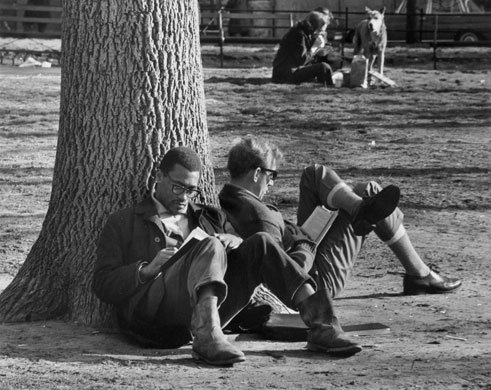…Far more baleful, however, than any of theo ther circumstances contributing to the demise of literacy and the degeneration of English can in some measure, significant measure seen in the abandonment of grammar in favor of what became known as modern linguisti science. The emnity between upholders of traditional grammar and the exponents of Structural Linguistics may be the deepest conflict in the whole battleground of education since it has been marinated in a political sauce with a spiritual component or lack therof. And the Structural Linguists basically won essentially driving grammar, as it was taught, out of most of the public schools by a virtual political takeover of the entire educational apparatus and bureaucracy. The cultural propaganda was that the method was a breakthrough, but what sort of breakthrough that was worthy of discarding centuries of educational theory to the scrapheap.
Structural Linguistics as both method and set of principles became the essential tool of cultural anthropologists concerned with studies of languages outside the Indo-European family, and especially those of primitive people without a system of writing. And, by virtue of its painstaking techniques of vocal sound analysis, it greatly assisted communication engineers in the design of equipment for the transmission of speech. The problem is that Structural Linguists were never content with a role as objective scientists, collectors of data and technicians. The yare possessed by a Weltanschauung that embraces psychology, sociology, and education which is propagated with religious fervor. It is their “basic principles” that are at root of the conflict which has flooded from educational circles to the nation at large.
In part, it is the notion of moral realtivity, that there is no such thing as good or bad in language. That there is no such thing as “written language” but only speech and writing, words do not have any real meaning, a dictionary or grammar is not as good an authority for your own speech as the way you, the individual actually speaks, words do not have any real meaning and so on.
In as much as Structural Linguistics developed in America out of the quiet work of a few anthropologists engaged in the study of American Indian tongues, it now appears astonishing that such a remote and highly specialized realm of scholarship could engender such a vast range of precepts bundled into a political construction of social and economic dimensions, and exercise such a powerful effect on the standards of English, and of the methods of teaching it in schools.

—There can be no doubt that structural linguistics, which flourished half a century ago on both sides of the Atlantic Ocean, lived up to its name: it was structural because it considered languages to be self-contained entities that had either to be shaped into a rigorous structure, or actually possessed a structure which was real and merely waiting to be discovered. There can be no doubt either that transformational grammar, which in its heydays pushed structuralism into quasi-total oblivion, lived up to its name: it was transformational because it posited several successive strata or structures in sentence generation which were linked by means of transformations of all sorts. On the contemporary scene, there can be no doubt that functional linguistics lives up to its name: it attaches a great deal of importance to the way in which languages function and to the functions of language. The question that will be raised in the next few pages is the following: does Cognitive Linguistics, as we know it today, live up to its name?—image: Pieter Bruegel the Elder
ADDENDUM:
(see link at end)…The founder of structural linguistics was Ferdinard de Saussure , who had great influence through his posthumously published Cours de Linguistique Generale , although he used the word “system” rather than “structure.” In criticizing the diachronic perspective of nineteenth-century comparative grammar, Saussure claimed that language has a systematic aspect. It embodies laws of equilibrium that operate on its elements and yield a synchronic system. Structural linguistics separates linguistics from other disciplines and renders it a special science. Other major expositors of structural linguistics include Bloomfield ( Language , 1931) and Zellig Harris ( Methods in Structural Linguistics , 1952). Through criticism of structural linguistics, Chomsky developed his transformational-generative linguistics. Chomsky believes that the wholeness of linguistic structures is based on the laws of transformation. Read More:http://www.blackwellreference.com/public/tocnode?id=g9781405106795_chunk_g978140510679520_ss1-211








 COMMENTS
COMMENTS
A useful tactic of the charlatan is, if you can’t change the words spoken, change the meaning of the words.